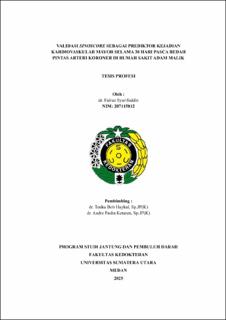| dc.description.abstract | Abstact
Background:
Preoperative assessment to identify patients at high risk for major adverse cardiovascular events (MACE) after coronary artery bypass grafting (CABG) is pivotal. To date, no ideal score for predicting MACE in Indonesia has been determined. The purpose of this study was to compare SinoSCORE, EuroSCORE II, and ACEF II risk score for predicting 30-day MACE after isolated CABG.
Methods:
A cohort retrospective study was conducted from January 2023 to February 2025 in Adam Malik Hospital utilizing data collected from the medical records of patients undergoing isolated CABG. SinoSCORE, EuroSCORE II, and ACEF II risk score were calculated to predict overall MACE, mortality, myocardial infarction, rehospitalization for acute heart failure, and stroke within 30 days after isolated CABG.
Results:
A total of 230 patients were included. We observed 27% in MACE, 18.3% in mortality, 4.8% in myocardial infarction, 2.6% in rehospitalization for acute heart failure, and 1.7% in stroke incidence among all patients. EuroSCORE II (AUC = 0.702; 95% CI: 0.622–0.782; p < 0.001) and ACEF II risk score (AUC = 0.620; 95% CI: 0.533–0.706; p < 0.001) had fair and poor discriminant power, respectively; however, SinoSCORE (AUC = 0.581; 95% CI: 0.489–0.674; p = 0.058) was statistically insignificant to predict 30-day MACE. EuroSCORE II (AUC=0.731; 95% CI: 0.645–0.817; p < 0.001) and ACEF II risk score (AUC=0.649; 95% CI: 0.551–0.747; p=0.003) had fair and poor discriminatory power, respectively; however, SinoSCORE (AUC=0.595; 95% CI: 0.488–0.703; p=0.053) was statistically insignificant to predict 30-day mortality. All model risk scores were unable to predict myocardial infarction, rehospitalization for acute heart failure, and stroke within 30 days after isolated CABG.
Conclusion:
SinoSCORE could not predict 30-day MACE after isolated CABG, but EuroSCORE II showed a reasonable ability to predict these events in patients who had isolated CABG. | en_US |


